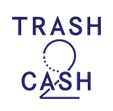
TEXTILE RECYCLING
Textile industry is accused of being one of the most polluting industries. Waste is produced not only at the point of production, but also during consumption. To counter the problem, textile industry has taken many measures for reducing its negative contribution towards the environment. One of such measures is textile recycling: the reuse as well as reproduction of fibres from textile waste. Tekstina decided to take part in searching for a solution for reuse and recycling of textiles with two European projects: Resyntex and Trash to cash.

